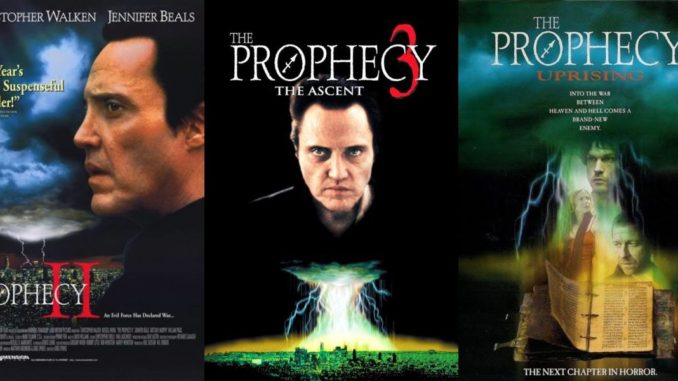
Despite being very firmly non-religious, I love me a good – or an enjoyably bad – film about religion. So, it seems, do movie goers, and they have since the very earliest days of cinema. Cecil B. De Mille’s The Ten Commandments was the second-highest grossing film of 1923, and set a Paramount box-office record not broken for 25 years. But as far back as 1900, the Australian Salvation Army produced Soldiers of the Cross, a multimedia show combining film, slides and a live sermon, which toured the US and Australia for almost two decades.
They have remained popular ever since: it may help that the Bible is public domain, offering a mine of stories, free for the taking to film-makers. But there’s a reason The Passion of the Christ remains the highest-grossing R-rated movie in North America, seventeen years after its release, taking more than Deadpool and Joker. Inflation adjusted, The Exorcist (#11 on the list in gross take) is right up there as well. Admittedly, not all do as well. Anyone remember 2016’s Ben-Hur remake? It didn’t even cover its $100 million production budget worldwide. So there’s no such things as a sure hit, even with God in your corner.
Still, there’s one area where such films do parallel, say, the behemoth which is comic-book movies. If you get a hit, there’s every chance it will be followed up by a sequel. While we still await Mel Gibson’s follow-up to Christ [I’m not kidding], The Exorcist spawned two sequels, two prequels, a television series and The Ninth Configuration, which author William Peter Blatty regards as the “true” sequel. It’s not alone. The Omen got three sequels and a remake. Even outside the horror genre, the Left Behind movie was popular enough to generate two sequels, a spin-off and a reboot. Success breeds… well, if not necessarily success, further attempts to go down the same road.
Which brings me to The Prophecy which, at five movies over the span of a decade, is one of the longest-running movies with a religious theme, even if only the first received theatrical distribution. Admittedly, it’s not what you would usually imagine “faith-based cinema” to be: rather too much heart-ripping and casual re-writing of theology for that. But it is fundamentally Christian, and with the emphasis fairly firmly on “fundamental,” since it takes a solidly Old Testament approach. Satan is real, Hell is real, and angels are not fluffy, Emmanuelle Beart-shaped creatures of love. I find this approach much more appealing. So, let’s delve into each the movies in turn, and see what we find – with and without Christopher Walken.

The Prophecy (1995)
Rating: B-
Dir: Gregory Widen
Star: Elias Koteas, Christopher Walken, Virginia Madsen, Eric Stoltz
This is a film about religion, rather than a religious film. That may seem a meaningless distinction, but it does actually matter. Here, there is no need for a buy-in from the audience to a particular theology. In religious films, such as Left Behind or The Omega Code, it’s very much the case that they are literally preaching to the converted. While they can still be entertaining (for a variety of reasons) to non-believers, the central tenet of that kind of film, is that the viewer already shares its faith. Here, the reverse is probably the case. I suspect Christians, especially of the more fundamentalist kind, might be a bit miffed at the heretical (if not blasphemous) notions which go into the plot.
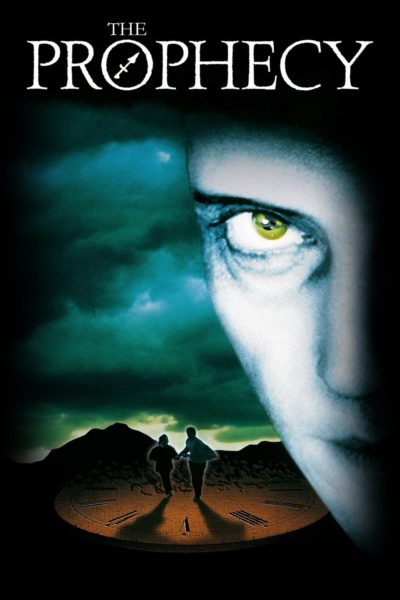 In particular, the idea that angels would abandon serving God, and go to war with each other for their own ends. Here, the two sides are led by Simon (Stoltz) and Gabriel (Walken), who are battling over control of a particular human soul. While, interestingly, Jesus and God seem to prefer to stay out of this particular conflict, that’s not the case for Lucifer (Viggo Mortensen, after Sean Penn had to drop out very late), who has his own reasons for picking a side. Pity any poor humans who happen to get in the way: in particular, police detective Thomas Dagget (Koteas), who almost became a priest before a crisis of faith, not dissimilar the one being suffered by Gabriel; and schoolteacher Katherine (Madsen), who gets involved because the soul in question ends up embedded in one of her pupils.
In particular, the idea that angels would abandon serving God, and go to war with each other for their own ends. Here, the two sides are led by Simon (Stoltz) and Gabriel (Walken), who are battling over control of a particular human soul. While, interestingly, Jesus and God seem to prefer to stay out of this particular conflict, that’s not the case for Lucifer (Viggo Mortensen, after Sean Penn had to drop out very late), who has his own reasons for picking a side. Pity any poor humans who happen to get in the way: in particular, police detective Thomas Dagget (Koteas), who almost became a priest before a crisis of faith, not dissimilar the one being suffered by Gabriel; and schoolteacher Katherine (Madsen), who gets involved because the soul in question ends up embedded in one of her pupils.
It has easily been twenty years since I saw this, and about all I could remember was Walken’s angel touching people’s faces and sending them to sleep with a “Ssh!’. That is, still, the coolest thing here, though in general he is absolutely perfect casting as a disgruntled angel. In the early nineties – I’d say from King of New York through to Nick of Time – he was unstoppable, and we are basically at Peak Walken here. Though most of the cast inhabit their roles effectively, at least for the ethereal characters. Koteas and Madsen are perhaps less impressive; that’s as much a result of Widen’s script which largely reduces humanity to what Gabriel calls “talking monkeys”. The lobbing in of native American culture also seems a bit out of place.
While he had written the scripts for Highlander and Backdraft (you can perhaps see the former’s influence, in the idea of immortals battling around a largely oblivious humanity), this was his debut as a feature director. He said he was inspired by a Sam Shepard monologue about an angel that had fallen to earth, and he embraced the “alien” aspects: “Their life and what concerns them is just outside our frame of reference”. Until the end, it’s fairly restrained in terms of spectacle, which is likely for the best. The optical effects have not aged well, though given the budget at the time, according to Widen, was only $2.8 million, they perhaps weren’t all that to begin with. But it does largely live up to Widen’s tongue-in-cheek working title: Scared Shitless by an Angel.
Original review: [20] Another entry in the “religious apocalypse” genre, Walken (again!) plays rebellious archangel Gabriel like a mobster, as he hunts the blackest soul in the world. Only people between him and it are a good angel (Eric Stolz) and a priest who lost his faith and became a cop instead. Gothic horror-fantasy, effectively driven by Widen, that uses FX sparingly on the whole, leaving Stolz and Walken room to act. After this, the finale is something of a disappointment, with dodgy optical work (Widen wrote Highlander, which had the same problem), though Viggo Mortensen as Lucifer almost steals the film. I suspect we might get more of this sort of thing as the millennium approaches…
[Indeed, there is also in existence Prophecy II, which certainly comes into the category of “more of this sort of thing”. Sadly though, in this case more is less, and even the return of Christopher Walken can’t manage to save a very tired looking sequel, possessing little or none of the innovatively creepy stuff which characterised the first film. The Devil may have all the best tunes, but he also has some rather poor movies…] B-

The Prophecy II (1998)
Rating: C+
Dir: Greg Spence
Star: Jennifer Beals, Christopher Walken, Russell Wong, Brittany Murphy
There wasn’t exactly an open ending at the end of The Prophecy, but its decent box-office success meant a sequel was inevitable – albeit direct to video, rather than theatrical. Outside of Walken, it’s an almost entirely new cast. Most of the other characters are new too, and recast if not. Detective Thomas Daggett, for example, became a monk and is now played by Bruce Abbott of Re-Animator fame. But very wise of the studio to bring Gabriel (Walken) back, despite having his heart torn out by Lucifer. The excuse is that the Devil has had enough of him in Hell, and tosses the angel out, like a bad room-mate.
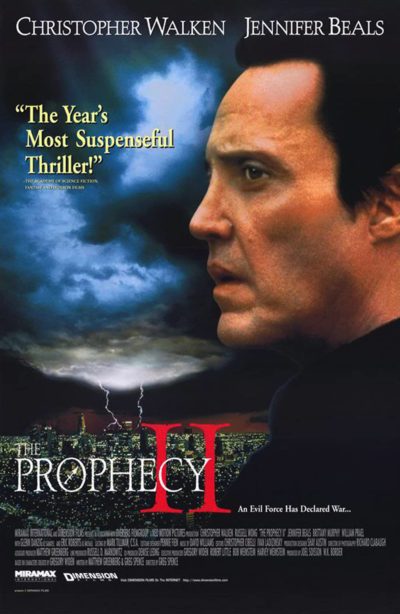 Back on Earth, angel Danyael (Wong) seduces and knocks up nurse Valerie (Beals). The resulting crossbreed, known as a Nephilim – pauses to remember a second-tier Goth group of the eighties – is a marker pointing towards the end of the war in Heaven. So Gabriel intends to track down its mother and prevent it being born. Basically, this is The Terminator with wings. To that end, because Gabriel still has issues with the modern world, he recruits failed suicide Izzy (Murphy), to drive and work computers. I dunno, you’d think anyone who had hung out with Satan, would be very familiar with Microsoft products. After chasing Valerie around for much of the film, things come to a head in a battle in what was once Eden – now, apparently a suburb of Blade Runner.
Back on Earth, angel Danyael (Wong) seduces and knocks up nurse Valerie (Beals). The resulting crossbreed, known as a Nephilim – pauses to remember a second-tier Goth group of the eighties – is a marker pointing towards the end of the war in Heaven. So Gabriel intends to track down its mother and prevent it being born. Basically, this is The Terminator with wings. To that end, because Gabriel still has issues with the modern world, he recruits failed suicide Izzy (Murphy), to drive and work computers. I dunno, you’d think anyone who had hung out with Satan, would be very familiar with Microsoft products. After chasing Valerie around for much of the film, things come to a head in a battle in what was once Eden – now, apparently a suburb of Blade Runner.
There are a number of familiar faces here, albeit lower-tier ones, and that helps elevate proceedings. In addition to the above, there is Eric Roberts, Glenn Danzig (nobody mention Verotika…) and some guy we recognized from Buffy, who it turns out, also wrote the last two movies in the Hunger Games franchise. Who knew? The Gabriel/Izzy interaction is also a pleasure to watch. While there was a similar sidekick character to her in the first film, we didn’t see the relationship from the beginning, so it felt less complete. But again, this is Walken’s world, and the rest of us are just orbiting him. It does seem more conventional in terms of lore, with the man upstairs taking a less passive role, and no need to invent entire additional books of the Bible, unlike its predecessor.
The cheapness does sometimes break through. Most obviously, the scene where Danyael proves his angeliciousness to Valerie, unfurling his wings. It’s almost entirely played out in her reaction shots. And, for someone supposedly 4-6 months pregnant, Valerie is a remarkably active preggo: running, climbing fences and leaping off buildings. I guess half-angel foetuses are made of sturdy stock. Beals may be the film’s weakest ingredient; she seems to think making a blank expression, with her lips slightly parted, passes for dramatic acting. Leave that to Chris, please. Still, when I first saw this, I was singularly unimpressed, but now, it’s by no means bad. At least, by the standards of mid-nineties straight to video movies, anyway. Don’t get your hopes up too high.
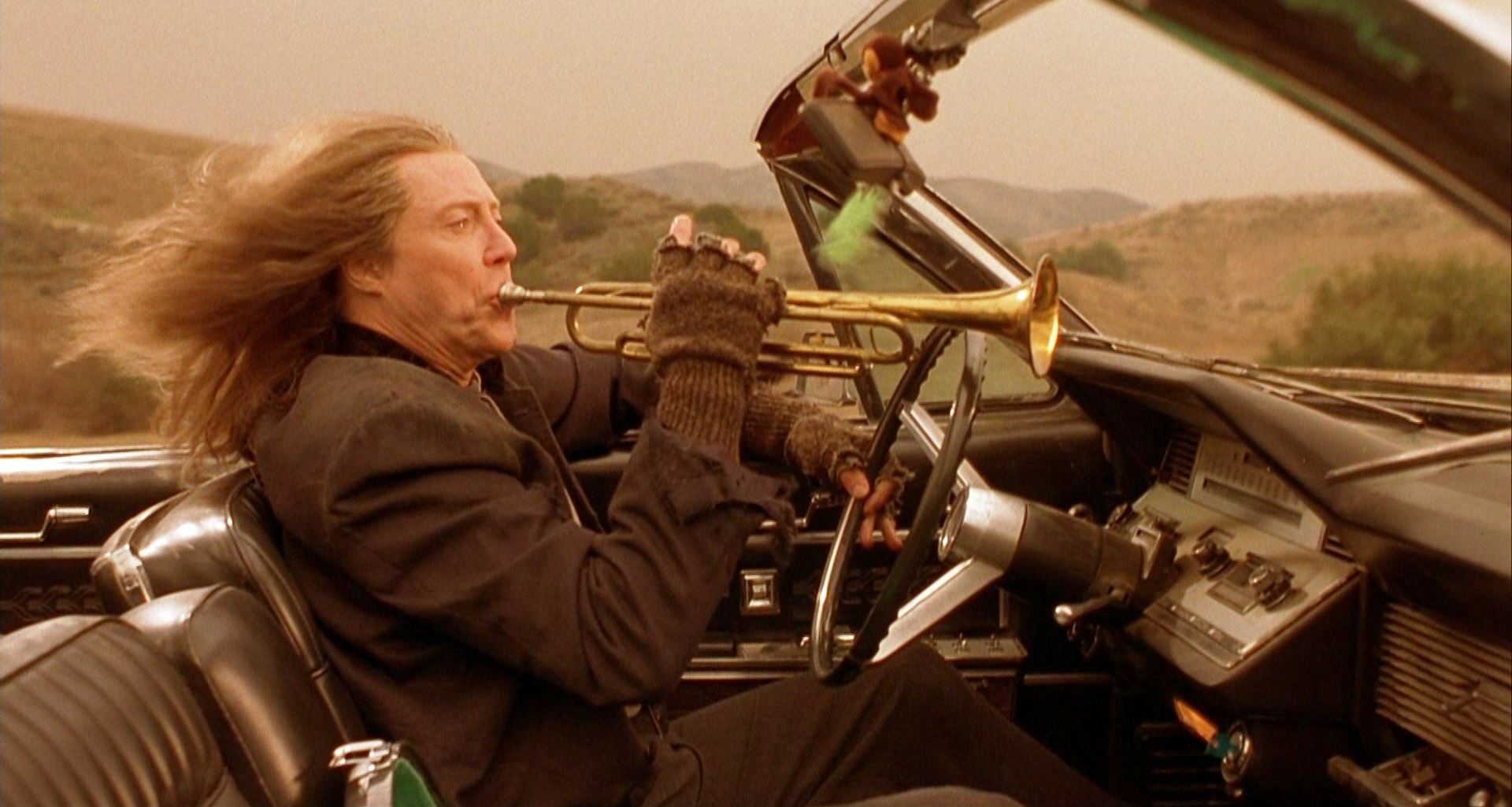
The Prophecy 3: The Ascent (2000)
Rating: C-
Dir: Patrick Lussier
Star: Dave Buzzotta, Vincent Spano, Christopher Walken, Kayren Butler
Walken has never exactly been a franchise player. Of his over a hundred film credits on the IMDb, this appears to be the only part three. Even part twos are rare: his minor role in Joe Dirt 2 is about it [while he was in Wayne’s World 2, he didn’t appear in the original]. Which makes it all the more surprising he signed up for this – I suspect he enjoyed the role of Gabriel. His taking the role was instrumental in the original film getting financed, but I get the sense he was tiring of it by this point. There’s a scene here in a roadside diner which repeats, largely word-for-word, the conversation with the waitress from the first movie. That’s kinda the point (they even brought back the same actress), but it indicates the degree of recycling involved, and that cannot be particularly fulfilling for an actor like Walken.
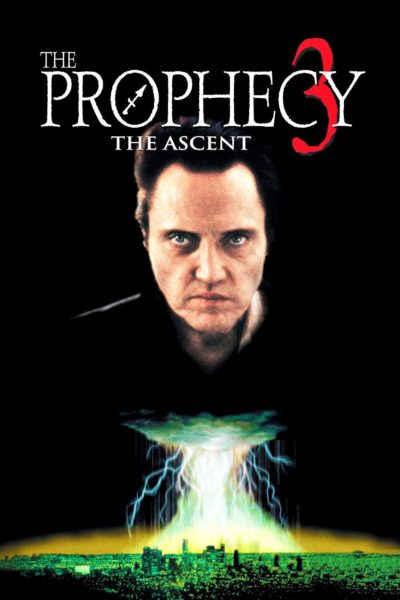 Once again, we’re in angel hunting territory. The target this time is Danyael (Buzzotta), the half-human, half-angel nephilim spawned in The Prophecy 2. He’s now grown-up and a preacher – albeit an unconventional one telling the congregation they’re basically on their own, because God doesn’t care. Some angels want him dead: quite why they waited for him to reach adulthood is unclear. But Danyael is quite hard to kill. Turns out, his heart needs to be removed: enter Zophael (Spano) in hot pursuit, with a pointy tool designed for that purpose. Gabriel, meanwhile, has seen the light after spending a couple of decades as a human, and is more or less on Danyael’s side, as the nephilim seeks to end the war in heaven.
Once again, we’re in angel hunting territory. The target this time is Danyael (Buzzotta), the half-human, half-angel nephilim spawned in The Prophecy 2. He’s now grown-up and a preacher – albeit an unconventional one telling the congregation they’re basically on their own, because God doesn’t care. Some angels want him dead: quite why they waited for him to reach adulthood is unclear. But Danyael is quite hard to kill. Turns out, his heart needs to be removed: enter Zophael (Spano) in hot pursuit, with a pointy tool designed for that purpose. Gabriel, meanwhile, has seen the light after spending a couple of decades as a human, and is more or less on Danyael’s side, as the nephilim seeks to end the war in heaven.
Mostly, this feels like a retread of the second film, with Danyael being pursued by Zophael and a member of his flock (Butler). Gabriel, meanwhile, has learned to drive in his time on Earth, so no longer needs a minion for that. It all feels rather underwritten, with the end suddenly shifting focus on to another antagonist angel, Pyriel, and a terrible deus ex machina in the form of a lightning bolt. After 2.95 movies on the sidelines, God apparently decides to play favourites? For Lussier’s feature debut (he’d go on to the Dracula 2000 franchise, as well as Drive Angry), they brought in Power Rangers’ Koichi Sakamoto to do stunts. That adds a martial-arts feel to the battles, though the impact is lessened by some dreadfully choppy editing.
Initially, it seems that the coroner, Joseph, was going to be the human focus here (he’s played by Steve Hytner – he and Walken are the only actors in all three installments). However, he vanishes after the first third, as the film heads back to Arizona. Though probably the film’s biggest flaw, is shuffling Gabriel off to the side: instead, he’s largely trailing along in the wake of Danyael and Zophael. None of the new cast make much impression, and even a brief Brad Dourif appearance feels wasted. I don’t blame Chris for bowing out at this point, especially with his character’s arc coming to a natural conclusion. The studio, however, decided there was still some life left in this equine…
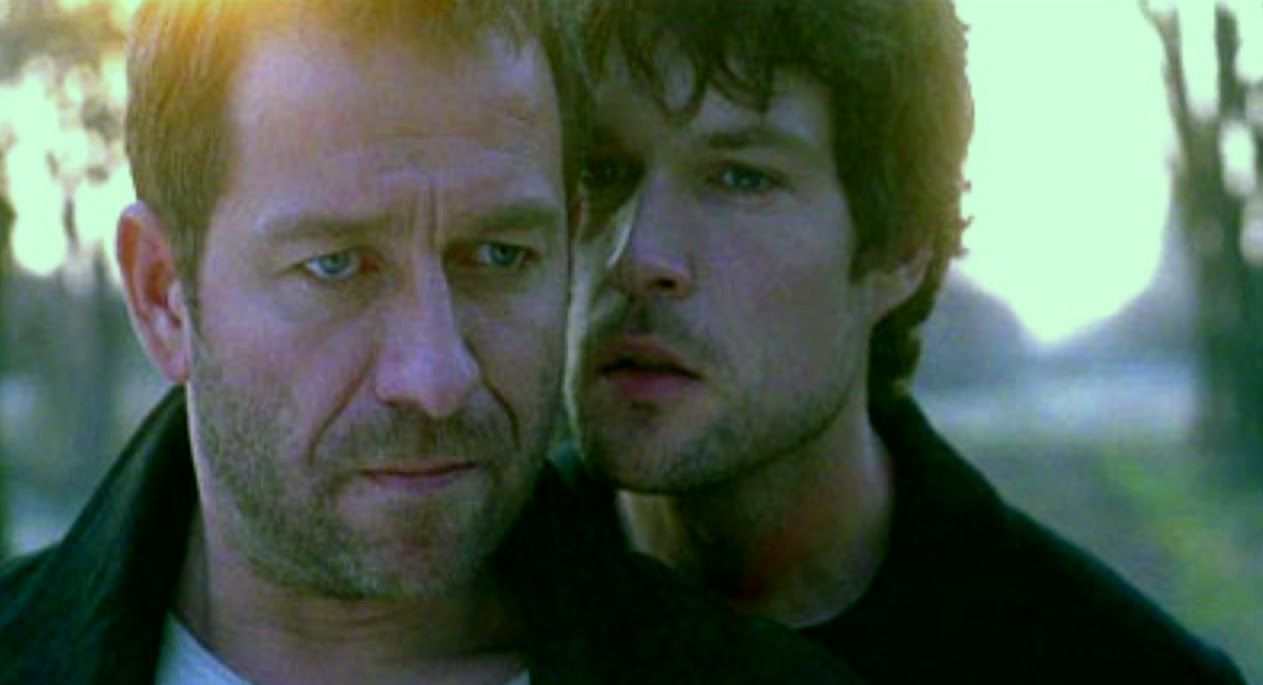
The Prophecy: Uprising (2005)
Rating: B-
Dir: Joel Soisson
Stars: Sean Pertwee, John Light, Kari Wuhrer, Doug Bradley
All the pieces were in place for the fourth entry in the Prophecy franchise to be a disaster. Five years after the previous installment, with no Christopher Walken in view, a producer of the previous entries getting promoted to writer/director, and shot in Romania. Those are rarely good signs. So, get out the Crayolas and colour me Surprised Umber, for this actually ends up being decent. Again, we’re not talking Oscars, yet for a straight-to-video fourth entry, it was more than passably entertaining. The main factor in its success is going in a fresh direction: rather than a war in heaven, this is about a war in hell. between Satan and a renegade lieutenant, Belial, who wants to set up his own inferno.
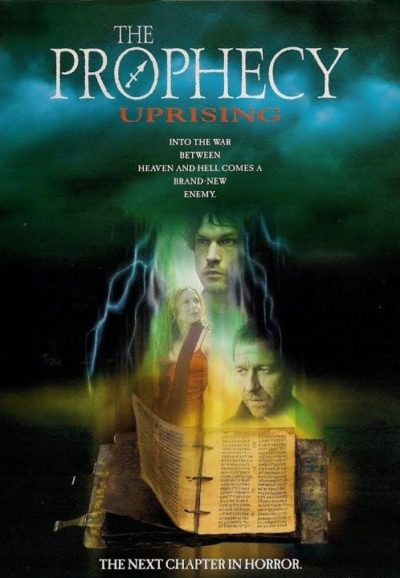 The format is, however, similar in that the factions are both after a MacGuffin, in this case a copy of the Bible to which new material is being mystically added. This includes the name of the Antichrist, which would give either demon a massive advantage in their struggle. It’s now in the hands of Allison (Wuhrer), a theology student who hears voices. Meanwhile, bad cop Dani Simionescu (Pertwee) has found himself assigned a new partner, Interpol agent John Riegert (Light). Turns out Dani and Allison have a connection, dating back to Communist days, and Belial is using his body-hopping skills to get closer to his target, ending up in the body of another local cop, Laurel (Bradley, his head unrecognizably pin-free).
The format is, however, similar in that the factions are both after a MacGuffin, in this case a copy of the Bible to which new material is being mystically added. This includes the name of the Antichrist, which would give either demon a massive advantage in their struggle. It’s now in the hands of Allison (Wuhrer), a theology student who hears voices. Meanwhile, bad cop Dani Simionescu (Pertwee) has found himself assigned a new partner, Interpol agent John Riegert (Light). Turns out Dani and Allison have a connection, dating back to Communist days, and Belial is using his body-hopping skills to get closer to his target, ending up in the body of another local cop, Laurel (Bradley, his head unrecognizably pin-free).
As well as a switch from heaven to hell, the “talking monkeys” are given rather more back-story than in previous installments, and that works to the film’s overall benefit. While Walken is always going to be missed, I like Pertwee as an actor. He’s as good value as usual here, even if his strongly English accented Romanian cop is excused rather than explained. Light seems to be doing a low-rent impression of Benedict Cumberbatch, and is just off-kilter enough to be provocatively intriguing. The laissez faire approach taken by God/Jesus also makes more sense here, given we’re dealing with an internal power struggle in their enemy’s territory. However, Wuhrer doesn’t get that much to do, and the angelic voices in her head aren’t developed enough: they’re more a convenient plot device.
It is probably better to treat this as a separate, stand-alone entity – or at least something which inhabits the same Prophecy universe, rather than being a direct successor to parts 1-3. If you can stop looking for Chris W to pop up out of every corner, and treat this as its own creature, you are considerably more likely to get something out of it. It definitely did a better job of holding my attention than either II or III. For whatever reason, I was getting a Warlock vibe at some points, perhaps in its admirably dead-pan approach to events which, in many ways, are frankly ridiculous. I am genuinely interested in seeing how the series finishes.
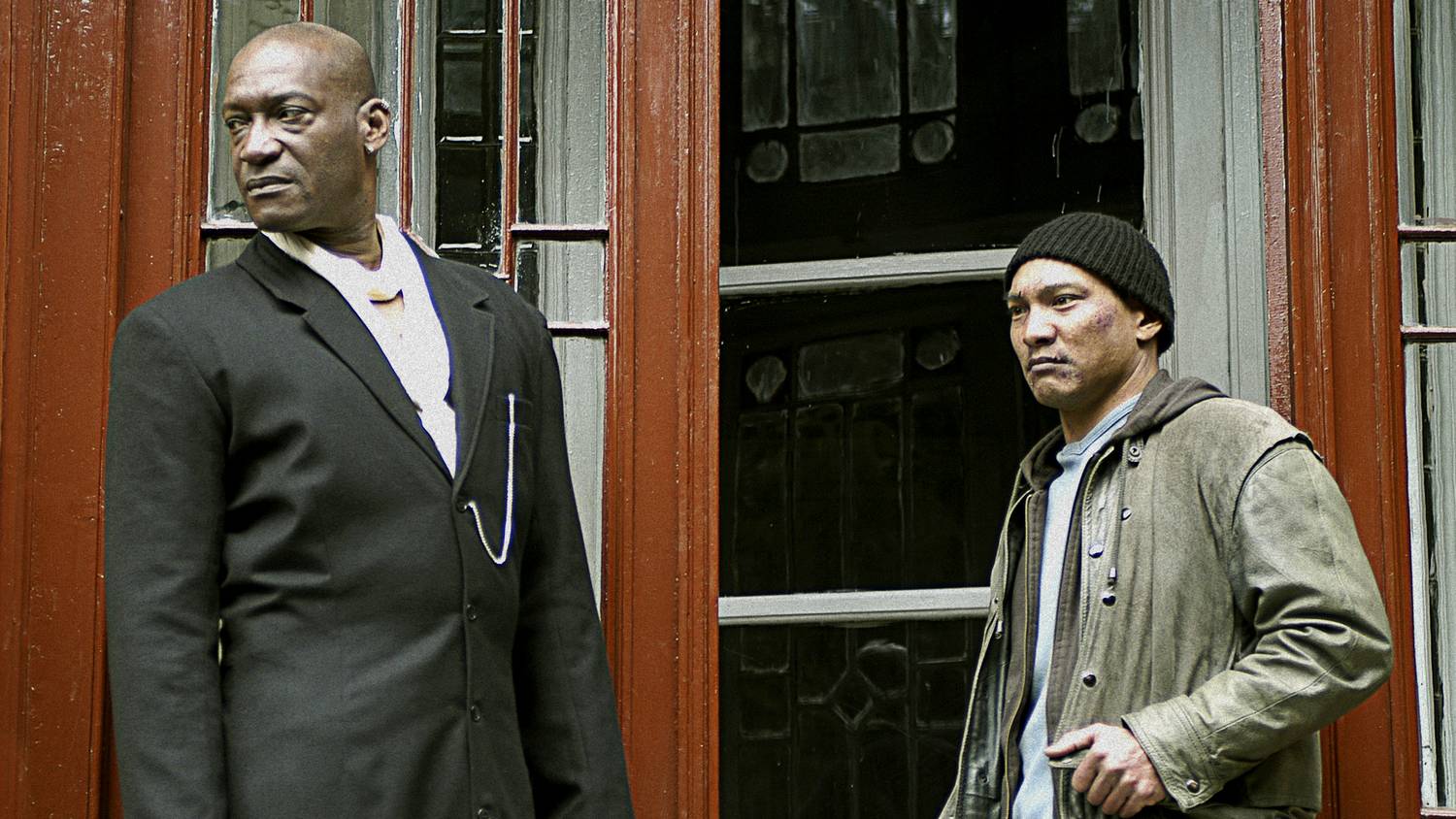
The Prophecy: Forsaken (2005)
Rating: C
Dire: Joel Soisson
Star: Kari Wuhrer, Tony Todd, Jason Scott Lee, John Light
And, so, it ends. Not with an apocalyptic bang, but a somewhat underwhelming whimper. While parts 1-3 may have steadily declined in quality, they did provide a complete, satisfying character arc for Christopher Walken’s Gabriel. The same cannot be said for 4-5, in regard to their lead character, Allison (Wuhrer). Though these were shot back-to-back in Romania, and should be considered a single narrative entity (even if this one runs barely 75 minutes, and that includes footage recycled from #4), it lacks a definitive conclusion. I suspect they were hoping for further installments, a goal which remains unfulfilled, 16 years later. Especially after its predecessor breathed unexpected new life into the franchise, this feels a disappointing way for things to end.
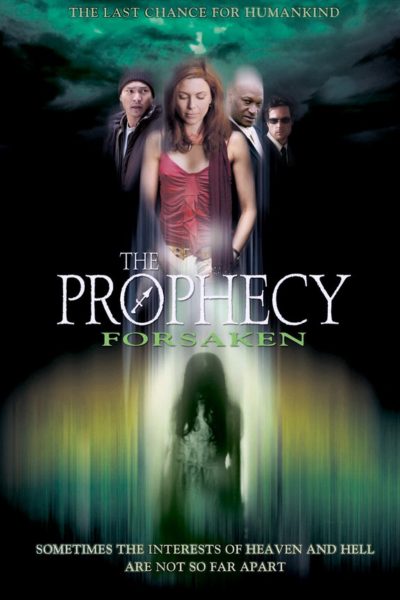 I will say, though: the casting remains on point. This time Todd and Lee join the team, both veterans of many a genre flick. Todd is especially well-suited for seraphim Stark, seeking the page from Allison’s self-writing Bible which identifies the newly-born Antichrist. His sonorous voice and presence give proceedings a weight which make it easy to believe this is Serious Business. Lee plays Stark’s assassin, Dylan, sent after Allison so the angel can keep his hands clean (I guess in this world, God knows when you masturbate, not when you kill someone). But he goes through several changes of heart and crises of conscience over the film. These are signified by Lee pulling an angst-ridden face. Yeah, drama is probably not the martial artist’s biggest strength, and there is surprisingly little ass-kicking for him to do, making his selection for the role an odd one.
I will say, though: the casting remains on point. This time Todd and Lee join the team, both veterans of many a genre flick. Todd is especially well-suited for seraphim Stark, seeking the page from Allison’s self-writing Bible which identifies the newly-born Antichrist. His sonorous voice and presence give proceedings a weight which make it easy to believe this is Serious Business. Lee plays Stark’s assassin, Dylan, sent after Allison so the angel can keep his hands clean (I guess in this world, God knows when you masturbate, not when you kill someone). But he goes through several changes of heart and crises of conscience over the film. These are signified by Lee pulling an angst-ridden face. Yeah, drama is probably not the martial artist’s biggest strength, and there is surprisingly little ass-kicking for him to do, making his selection for the role an odd one.
After being so gung-ho about wanting the book last time, Satan (Light) seems curiously disinterested now. He sits on the sidelines, occasionally passing sardonic comment, and his rival from #4, Belial, is now Lord of Not Appearing in This Movie. If you get that reference, you’ll understand why I laughed out loud when the name of the Antichrist was finally revealed, because – I guess, spoiler? – it appears on first glance that the man going to bring about Armageddeon will be… Michael Palin? Turns out it was just an unfortunate choice of font. But it still allowed us to quote Monty Python for about the next five minutes (“He’s not the Antichrist, he’s a very naughty boy…”). So not a bad thing.
It all builds to a confrontation between Stark, Dylan and Allison on a roof-top above the city streets. Though it could well have lasted about an hour less, if Stark simply had chosen a sidekick slightly more committed to the cause. It ends in a way which feels like a side-story to another religious franchise – The Omen: The Romanian Orphan Years – and, as in the previous film, the local setting does lend a dark, mystic quality that the urban America of the first three couldn’t offer. But instead of ending either with the Book of Revelations brought to life, or averted, the ending here is ambivalent, and likely to satisfy nobody.
